Mental health challenges—ranging from anxiety, depression, and OCD to more complex disorders like Alzheimer’s and schizophrenia—are becoming increasingly common. According to estimates from the National Institute on Mental Health, nearly one in five adults in the United States experiences some form of mental health issue. Globally, more than a billion people are affected by mental and behavioral disorders, creating what many call an invisible epidemic.
Meanwhile, pharmaceutical treatments for conditions like depression, ADHD, insomnia, and bipolar disorder generate billions of dollars annually. While these medications can provide relief for some, they often address symptoms without fully exploring or treating the underlying causes. This approach has led many researchers and integrative practitioners to reconsider how mental health is treated—particularly the relationship between the body, brain, and gut.
Rethinking Mental Health: The Gut-Brain Connection
Traditionally, the body and brain were seen as separate entities. The prevailing belief was that the foods people consumed and the state of their physical health had little impact on brain function. But growing evidence now shows otherwise. It’s becoming clear that mood, memory, attention, and even long-term cognitive health are deeply intertwined with gut health and systemic inflammation.
The gastrointestinal system—often called the “second brain”—produces over 90% of the body’s serotonin and around 50% of its dopamine. These neurotransmitters play essential roles in regulating mood, focus, and emotional balance. When gut health is compromised—by processed food, poor diet, antibiotics, or environmental toxins—it can trigger changes in brain chemistry that manifest as anxiety, depression, brain fog, or memory issues.
Toxins from additives, preservatives, pesticides, and hormones in food may also cross the blood-brain barrier, impacting brain function and increasing the risk for neurological conditions. As Dr. Mark Hyman notes in his book The UltraMind Solution, modern life exposes individuals to an overwhelming number of stressors and chemicals, which contribute to widespread dysfunction in both body and brain.
Healing the Brain by Supporting the Body
Many of the conditions commonly treated with psychiatric medications—such as ADD/ADHD, anxiety, insomnia, and even dementia—may actually stem from imbalances in the body. These can include nutrient deficiencies, hormonal imbalances, disrupted gut microbiota, chronic inflammation, or detoxification issues. Addressing these root causes may lead to improvements in brain function without relying solely on medication.
For example:
-
Vitamin B1 deficiency can mimic symptoms of dementia and is easily corrected through supplementation.
-
Antibiotic treatment for strep infections has been shown to relieve OCD symptoms in some children.
-
Gluten sensitivity has been linked to schizophrenia and bipolar disorder in certain cases.
By identifying and correcting these imbalances—through diet, supplementation, lifestyle changes, and toxin reduction—many people report noticeable improvements in mood, focus, sleep, and energy levels.
Four Key Steps to Support Brain and Body Health
-
Clean Up the Diet
-
Eliminate common inflammatory triggers like gluten, processed dairy, refined sugar, and artificial additives.
-
Focus on whole, nutrient-dense foods, including vegetables, clean proteins, and healthy fats.
-
Avoid known food allergens and track how the body and mind respond when these foods are removed.
-
-
Support Gut Health
-
Incorporate high-fiber foods like vegetables, nuts, and seeds to nourish gut bacteria.
-
Use probiotics and fermented foods to encourage a balanced microbiome.
-
Limit antibiotic use when possible, and support the digestive system with enzymes and prebiotics.
-
-
Improve Lifestyle Habits
-
Engage in regular physical activity, which promotes neurotransmitter balance and reduces inflammation.
-
Prioritize quality sleep, which helps reset brain function and supports emotional regulation.
-
Incorporate daily practices for stress reduction, such as meditation, breathwork, or time in nature.
-
-
Consider Key Supplements
-
Multivitamins to fill nutritional gaps.
-
B Vitamins, especially methylated forms like methylfolate and methylcobalamin, for brain function.
-
Vitamin C for immune and brain health.
-
Omega-3 fatty acids (DHA and EPA) from fish oil or algae for mood and cognitive support.
-
Magnesium (glycinate or threonate) for relaxation and nervous system balance.
-
The Role of Food Sensitivities
For many individuals, subtle food intolerances can contribute to chronic low-grade inflammation, which in turn affects brain function. Gluten and processed dairy are two of the most common offenders. Symptoms may be delayed and can show up as mood swings, fatigue, brain fog, or anxiety—often hours or days after consuming the food.
Eliminating these foods for several weeks can serve as an informal test. Many people report significant changes in mood, energy, and clarity of thought. After reintroducing potential trigger foods, a recurrence of symptoms can confirm the connection.
Feeding the Brain the Right Way
A nourishing, brain-friendly diet emphasizes:
-
Real, whole foods with minimal processing.
-
Healthy fats, especially omega-3s and saturated fats from clean sources.
-
Ample colorful vegetables and fruits, rich in antioxidants and phytonutrients.
-
Quality proteins, such as pasture-raised meats, wild fish, and eggs.
-
Fiber-rich carbohydrates from vegetables, fruits, and seeds, not refined grains.
Avoiding foods that impair brain function is equally important. These include trans fats, refined sugars, artificial sweeteners, and additives commonly found in packaged and fast foods.
Mental Clarity and Emotional Balance from Within
By supporting the physical systems that impact mental health—hormones, digestion, detoxification, nutrition, and microbiota—many people experience a noticeable shift in mental clarity, emotional stability, and overall well-being.
This integrated approach may not replace conventional treatments in every case, but it offers a powerful foundation for healing from the inside out. When the body is nourished and balanced, the brain is far more likely to function optimally.
In the end, the brain is not separate from the body—it’s deeply connected. And that means supporting mental health often begins with caring for physical health.











